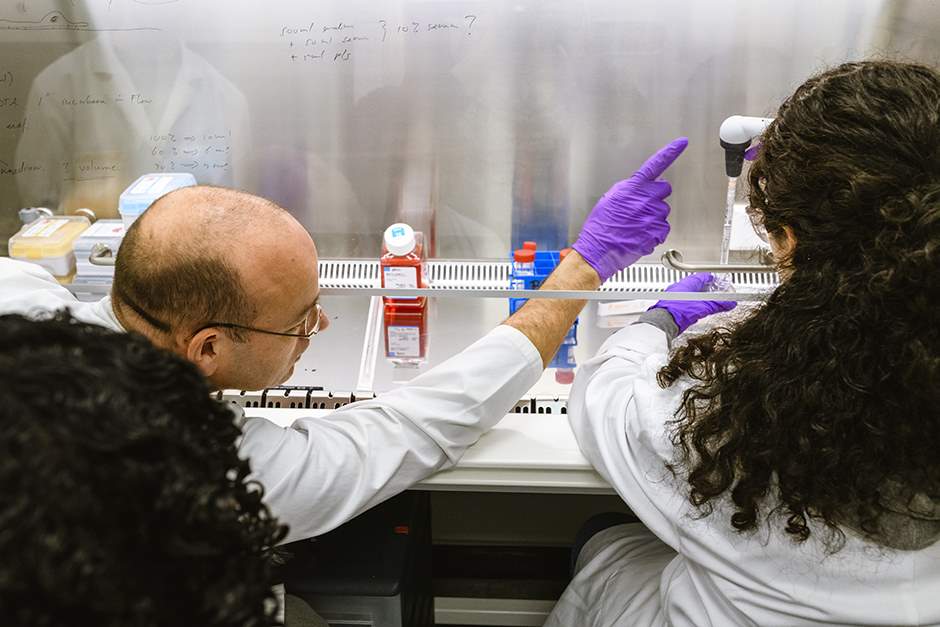People: the impact of our research on people and society
More and more people in the Netherlands are suffering from disease. Partly because people are living longer, and there are more and more older people in the Netherlands (aging of the population). But also because people have unhealthy lifestyles. The demand for healthcare is therefore increasing. Our survey shows that people are keen to know how research in innovations and new technologies helps to ensure that everyone who needs it, will (continue to) have access to healthcare.

With our scientific research, we improve healthcare for patients and ensure that it remains accessible. Together with regional, national, and international partners we do research that can make a real difference for society.
Curing diseases through the body’s own repair processes
At UMC Utrecht, we study treatments that help the body to repair itself (regenerative medicine). We use for instance smart materials that the body will use by itself to repair damaged tissue and organs. With this kind of innovative treatments, we will in the future be able to cure people from chronic diseases such as kidney failure, heart failure, and worn-out joints. Patients will thus need less (long-term) healthcare. It will improve their quality of life, and give other people faster access to the care that they need. In order to develop this type of treatment, we are collaborating with Utrecht University, Eindhoven University of Technology, Maastricht University, and the Hubrecht Institute in the DRIVE-RM scientific partnership. DRIVE-RM received the distinguished SUMMIT grant in 2024 from the Dutch Organization for Scientific Research (Nederlandse Organisatie voor Wetenschappelijk Onderzoek or NWO).
New technologies that put less burden on patients and healthcare
Improve the lives of patients with cancer, and at the same time, reduce waiting times for healthcare. With the latest medical technology, this is now possible. UMC Utrecht has for instance developed the MR-Linac , a device that produces highly targeted radiation. Fewer sessions are therefore necessary for example to treat patients with prostate cancer. Often no operation is needed, and therefore no hospitalization. This is very positive for patients and for healthcare. Our healthcare professionals therefore have more time for other patients. And our operating rooms can be used for people who need surgery. To speed up the development of this new type of (image-guided) technology such as the MR Linac, and subsequently to use it more effectively and faster in the hospital, IMAGINE was launched in 2024. In IMAGINE, companies, researchers and schools from around the world are working together on new technologies of this kind. Doctors make use of imagery here, such as MRI- or CT scans, in order to treat patients with great precision. This is why it is called image-guided treatment. It enables us to help people with cancer faster and more effectively, and to ensure that more people get the right care faster. This type of care is also becoming more affordable.
Nico van den Berg, professor in computational imaging: “Medical technology is never complete, it can always be better. A revolution is currently under way in AI, mathematical modeling, and smart sensors. By building these into image-guided interventions, we can provide even more effective care that requires less manual involvement from healthcare staff, which in turn will reduce their workload.”

Research on rare congenital metabolic disease
Another scientific study with which we are making an impact, is our research on metabolic disease in children . Metabolic disease is one of the most deadly diseases among children. In the Netherlands, about 10,000 families are affected by it. In 2024, our Professor Sabine Fuchs received a grant from the European Research Council (ERC) for her IMPACT project that should enable gene-correction therapy for the rare and severe metabolic disease MMA. Gene therapy is also becoming possible for children with the very rare metabolic disease MLD , which now increases their chances of survival. 3FM Serious Request in 2024 collected as much as € 12.5 million for the Metakids foundation and research on metabolic disease in children , which includes research at UMC Utrecht. Researchers from UMC Utrecht were of course closely involved in this 3FM action. Our aim is to be able to treat half of all patients in the next 10 years.